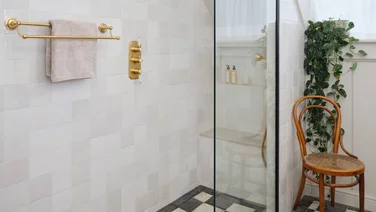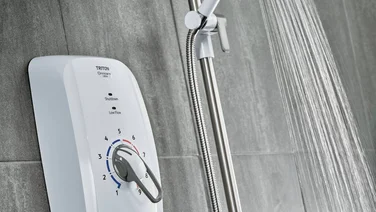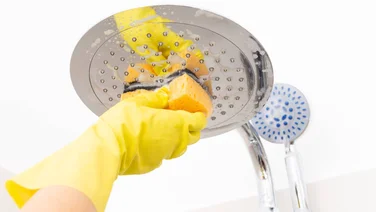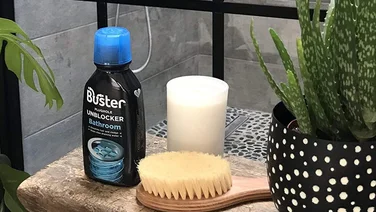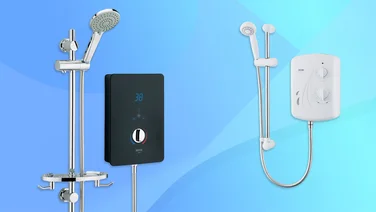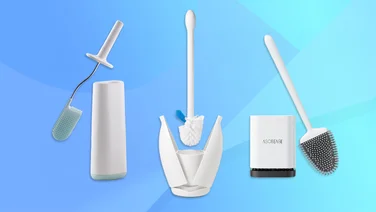To help us provide you with free impartial advice, we may earn a commission if you buy through links on our site. Learn more

No-one wants a leaking shower head. Not only is a constant drip, drip, drip highly irritating, but it also wastes water. In addition, it can cause real damage to your home.
“If the leak comes from your shower valve, water could get behind your bathroom walls, causing dry rot, mould and structural issues,” points out Kerry Hale, bathroom expert at Mira Showers.
A leak signals that something is wrong — in short, it shouldn’t be happening. There are several reasons why your shower head might be leaking and once you get to the bottom of the issue you can better understand how to put it right.
Our expert-led guide is here to give you all the information you need to identify the root cause of your leaky shower and explains how to sort it. In some cases, the fix might be easier than you think.
1. It just needs a good, deep clean
In some instances, the cause of a leaking shower head can be as simple as a build up of dirt. “It may need cleaning, as a build-up of dirt, grime and limescale can affect water flow, creating blockages that may result in leaks,” explains Kerry Hale.

There are lots of ways to remove limescale from a shower head, some of which require nothing more than a few store cupboard staples, such as vinegar and bicarbonate of soda.
“Remove your shower head from the hose, then soak it in vinegar for at least 30 minutes,” suggests Hale. “Rinse it with water and use an old toothbrush to remove any stubborn dirt, grime and limescale, paying close attention to the individual nozzles. Rinse it again.”
If the limescale is really stubborn you might need to use a professional limescale cleaner, such as HG Limescale Remover Foam Spray, £6.25 from Amazon.
2. Your shower head has worn or damaged seals
Another common cause for a leaking shower head is that it has worn, perished and damaged seals, or washers.
“A leaking shower head could be caused by worn or damaged inner seals,” advises Kerry Hale. “The rubber washers in your shower act as a seal between your shower head and hose, preventing water from leaking out. Over time, these wear down and water leaks out.”
To check, first remove your shower head. This should just be a case of unscrewing the head from the hose and won’t involve any tools. “If a washer looks worn or damaged, just replace it with a new one,” says Kerry.
The part you use needs to be compatible with your particular shower head, so it’s worth checking the manufacturer’s website or instruction manual. However, a universal washer could be the right size – just be sure to check the measurements carefully. A pack of five Arctic Hayes 1/2-inch shower washers costs just £1 at Screwfix.
3. The flow cartridge needs replacing
If you have a mixer shower and neither of the above issues seems to be the cause of your leaking shower head, there could be a problem with the flow cartridge — an internal part of a shower that regulates water flow.
Again, for most competent DIYers this shouldn’t be too tricky to solve.
“Before starting any repairs, find the stop tap or isolation valve and switch off the water supply,” picks up Kerry Hale. “Take off the decorative cover (usually where the hot and cold symbols are), then use a screwdriver to remove the cap from the flow cartridge. Use an adjustable spanner to remove the outer ring, and the cartridge can be unscrewed.
“After removing the old cartridge, replace it with a new one. Tighten the cartridge then Screw the cap back into place and replace the cover.”

4. There are broken or damaged threads
There are three main areas where shower heads tend to spring leaks. For hand-held showers, the point where the head meets the hose is a common area for drips to appear. Fixed shower heads often leak from the connector between the fixing plate and head. Shower hoses often leak at either of their connecting ends.
If, when removing the head, you have discounted (or dealt with) limescale build-up, worn seals or washers and faulty cartridges, it may be that the threads of the shower head or one of its connecting parts have broken. In this case, it is usually necessary to bite the bullet and invest in a new shower head or the relevant connecting part, such as the hose.
5. You have very high water pressure
In some cases, where your mains water pressure is super high, this can lead to a leaking shower head. This is most evident where the shower leaks even when it is off, as the pressure forces water through.
If this is the case, you should consider fitting a pressure-reducing valve. Not only will this resolve any dripping issues, but it will also prevent further damage from occurring.
Is it normal for a shower to drip after being turned off?
If your shower continues to drip once you have turned it off, should you be worried? Not necessarily. It is normal for some residual water to remain in the shower even after you turn it off, and this will drip out for a little while after. If it continues, however, it is likely to be caused by one of the above.

